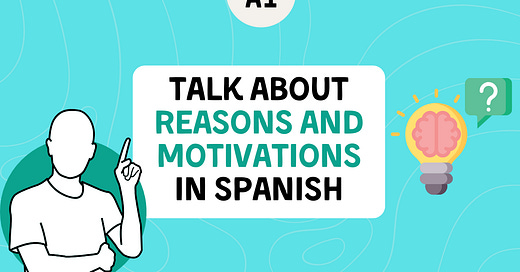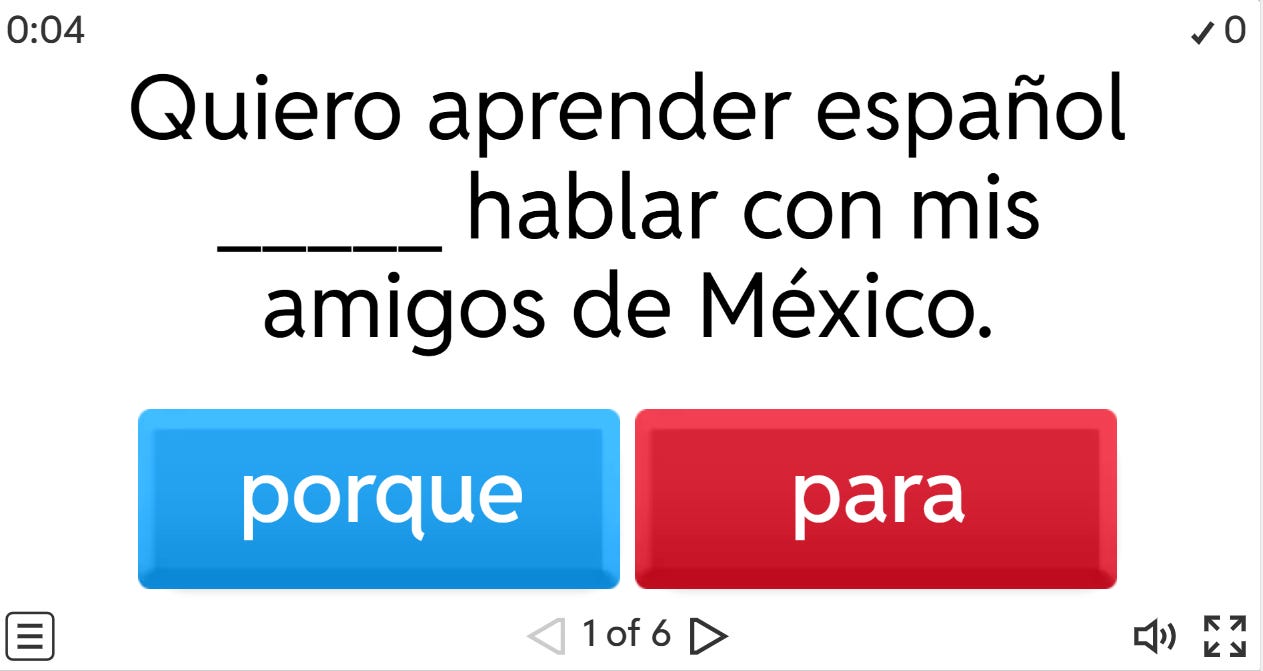Talk About Reasons and Motivations in Spanish (por, para, porque)
Learn how to talk about reasons and motivations in Spanish with this complete guide. Master "por," "porque," and "para" structures to express why you do things in Spani
Whether you're explaining why you're learning Spanish or discussing life decisions, expressing motivations is essential in any language. This guide will teach you how to talk about reasons and motivations in Spanish using simple, practical structures perfect for beginners (A1 level) and beyond.
Basic Structures for Expressing Reasons
1. Por + sustantivo (For + noun)
Use this when your reason is a noun or noun phrase:
Por mi familia (For my family)
Por el trabajo (For work)
Por la salud (For health)
2. Porque + verbo conjugado (Because + conjugated verb)
When your reason involves an action or state:
Porque necesito comunicarme (Because I need to communicate)
Porque me gusta mucho (Because I like it a lot)
Porque es importante (Because it's important)
Talking About Future Motivations
1. Para + infinitivo (In order to + verb in infinitive)
For goals or intended results:
Para viajar (To travel)
Para encontrar mejor trabajo (To find a better job)
Para hablar con mis amigos (To talk with my friends)
2. Porque quiero/quieres + infinitivo (Because I/you want to + verb in infinitive)
For personal desires:
Porque quiero aprender (Because I want to learn)
Porque quiero vivir en España (Because I want to live in Spain)
Porque quiero entender las películas (Because I want to understand movies)
💾 Save this picture to practice
Asking About Reasons
To ask "why?" in Spanish:
¿Por qué? (Why?)
¿Por qué + verb? (Why do you/does he...?)
¿Por qué estudias español? (Why do you study Spanish?)
¿Por qué trabajas aquí? (Why do you work here?)
Common Expressions for Giving Reasons
La razón es que... (The reason is that...)
Se debe a que... (It's due to the fact that...)
Es que... (It's that...)
Lo hago por... (I do it for...)
Example Conversations
At work:
¿Por qué tomaste este trabajo?
Porque me gusta el horario flexible.
(Why did you take this job?
Because I like the flexible schedule.)
With friends:
¿Por qué estudias medicina?
Para ayudar a las personas.
(Why are you studying medicine?
To help people.)
Travel plans:
¿Por qué vas a México?
Porque quiero aprender más español y por las playas.
(Why are you going to Mexico?
Because I want to learn more Spanish and for the beaches.)
Choose the correct connector (porque or para) to complete each sentence.
Click here to practice
Cultural Note
In Spanish-speaking cultures, people often give more personal or emotional reasons compared to English speakers who might give more practical answers. Don't be surprised to hear answers like "Porque me hace feliz" (Because it makes me happy) for what might seem like practical decisions.
Key Takeaways
Use por + noun for simple reasons
Use porque + verb for more complex explanations
Use para + infinitive for goals and purposes
¿Por qué? is your go-to question for asking reasons
Mastering these structures will help you express yourself more completely in Spanish and understand native speakers better. What are your reasons for learning these expressions? ¿Por qué quieres aprender a hablar de motivos en español? Share in the comments!
🚀 Want to Learn More?
📅 Book a 1-on-1 Spanish Lesson with me! 👉 Click here to schedule!
🎥 Subscribe to My YouTube Channel for more fun lessons! 👉 Subscribe Now!







